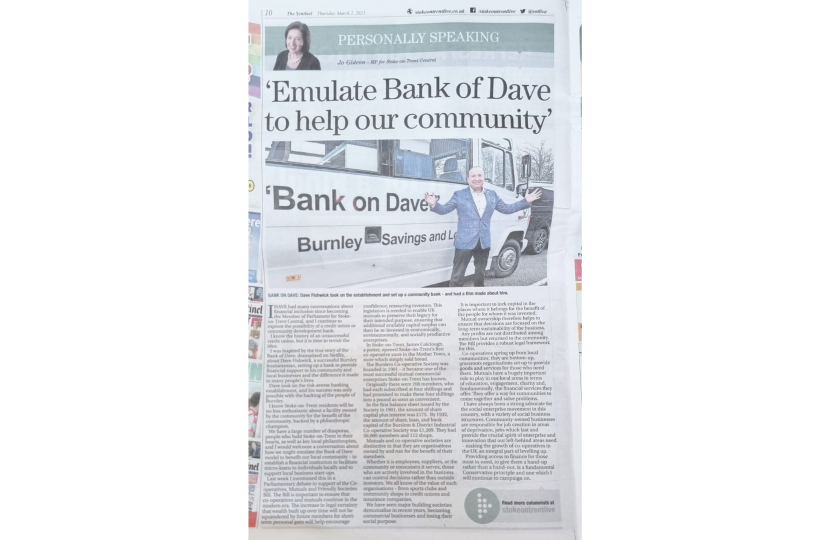
I have had many conversations about financial inclusion since becoming the Member of Parliament for Stoke-on-Trent Central and continue to explore the possibility of a credit union or community development bank. I know the history of an unsuccessful credit union but believe it is time to revisit the idea.
I was inspired by the true story of the Bank of Dave, dramatized on Netflix, about Dave Fishwick, a successful Burnley businessman, setting up a bank to provide financial support to his community and local businesses, and the difference it made to the lives of many people’s lives. Dave took on the risk-averse banking establishment and his success was only possible with the backing of the people of Burnley. I know Stoke-on-Trent residents will be no less enthusiastic for a facility owned by the community for the benefit of the community, backed by a philanthropic champion. We have a large number of diaspora, people who hold Stoke-on-Trent in their hearts, as well as key local philanthropists and I would welcome a conversation about how we might emulate the Bank of Dave model to benefit our local community -to establish a financial institution to facilitate micro loans to individuals locally and to support local business start-ups.
Last week I mentioned this in a parliamentary debate in support of the Co-operatives, Mutuals and Friendly Societies Bill. The Bill is important to ensure that co-operatives and mutuals continue in the modern era. The increase in legal certainty that wealth built up over time will not be squandered by future members for short-term personal gain will help encourage confidence, reassuring investors. This legislation is needed to help UK mutuals preserve their legacy for the purpose for which they were intended, making sure that additional available capital surplus can then be re-invested in economically, environmentally, and socially productive enterprises.
In Stoke-on-Trent James Colclough, a potter, opened Stoke-on-Trent’s first co-operative store on Newcastle Street in the Mother Town, a store which simply sold bread. The Burslem Co-operative Society was founded in 1901 - it become one of the most successful mutual commercial enterprises Stoke-on-Trent has known. Originally there were two hundred members, who had each subscribed four shillings, and had promised to make these four shillings into a pound as soon as convenient. In the first balance sheet Issued by the Society In 1901, the amount of share capital plus Interest was £175. By 1932, the amount of share, loan, and bank capital of the Burslem & District Industrial Co-operative Society was £1,209. They had 50,000 members and 112 shops.
Mutuals and co-operative societies are distinctive in that they are organisations owned by and run for the benefit of their members. Whether it is employees, suppliers, or the community or consumers that it serves, it is those who are actively involved in the business that are able to control decisions, rather than outside investors. We all know of the value of such organisations – from sports clubs and community shops to credit unions and insurance companies.
We have seen major building societies demutualise in recent years, becoming commercial businesses and losing their social purpose. It is important to lock capital in the places where it belongs, for the benefit of the people for whom it was invested. Mutual ownership therefore helps to ensure that decisions are focused on the long-term sustainability of the business. Any profits are not distributed among members but returned to the community. The Bill provides a robust legal framework for this.
Co-operatives spring up from local communities; they are bottom-up, grassroots organisations, set up to provide goods and services for those who need them. Mutuals have a hugely important role to play in our local areas, in terms of education, engagement, charity and, fundamentally, the financial services they offer. They offer a way for communities to come together and solve problems.
I have always been a strong advocate for the social enterprise movement in this country, with a variety of social business structures. Community-owned businesses are responsible for job creation in areas of deprivation; jobs which last and provide the crucial spirit of enterprise and innovation that our left-behind areas need – making the growth of co-operatives in the UK an integral part of the levelling up agenda.
Providing access to finance for those who are the most in need, to give them a hand-up rather than a hand-out, is a fundamental Conservative principle and one which I will continue to campaign on.
